
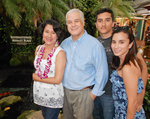

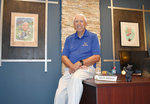
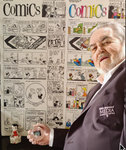
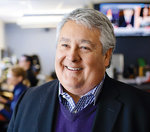
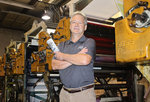
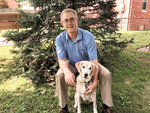


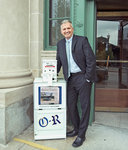
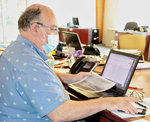


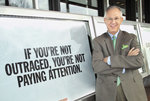

Our inaugural class of 15 Over 50 come from various backgrounds and markets, but they all share one thing: a passion for our industry. While many other industry vets may feel jaded or cynical during these unprecedent times, these men and women still see a bright future for journalism (no matter what platform it will appear on). They have spent their entire careers inspiring and motivating others, so as you read on, I hope their experience and fortitude will do the same to you.
(in alphabetical order by last name)
Robert E. Bard, 72
CEO, LATINA Style Inc.
Dallas, Texas
First journalism job: Sports correspondent, NFL at Mundo Artistico
What are some of the most important lessons you have learned while working in the news industry?
The greatest change has been how news outlets have completely abandoned “just the facts” in favor of opinion flavored news. If you add the total lack of control of what goes on social media, I wonder what future historians will write.
What are your predictions for where journalism is heading?
I’m very concerned as the average public does not have the time or resources to study multiple sources to try get the real news. I am sure that all news has been through the years “flavored,” but today, it is to the point that we cannot tell which of the stories is really real. The adage that the winners write history has never been so true. You can edit, Photoshop and manipulate any kind of message. Will the hackers win in the end? I hope not but I am not so sure.
Bruce Behymer, 53
Minority owner and marketing dude, Harvey County Now
Newton, Kan.
First journalism job: Advertising executive
What are some of the most important lessons you have learned while working in the news industry?
The news industry can be a harsh and cruel mistress. She doesn’t care about you or your time. She’s always churning. She’ll boost your ego with an award for something you have written or an ad you created. Then that same day she’ll kick you in the stomach by pointing to your prized piece sitting in a trash at the local diner covered in bacon grease and coffee grounds. With all her brutality, she has a soft side. She’ll bestow upon you a chance to photograph a group of happy kids earning their first dollar at a lemonade stand or an interview with local heroes. If you do crawl in bed with her, respect her, stay humble, learn balance and escape from her when you can to your favorite watering hole for an ice cold beer.
No matter how hot the story or how beautiful the ad, once the ink hits the paper, your job is done and out of your control. Move on.
Life is hard, beers spill, typos happen and ad deals fall through. If you accept this, just do your damnedest and detach from all outcomes, life will move a lot smoother.
What are your predictions for where journalism is heading?
Even though social media, hedge funds and the ugly greed of corporate America has caused havoc, sadness and chaos in the world of journalism, fear not. As long as there are humans on the earth with stories to tell, newspapers will exist. And if they are locally owned newspapers without hedge funds, shareholders or corporate philistines sticking their noses in where they don’t belong they will even grow and prosper. You watch.
Rollin Bergman, 76
Publisher, Page 1 Publications. Inc.
East Grand Forks, Minn.
First journalism job: Advertising sales, Norman County Index, Ada, Minn.
What are some of the most important lessons you have learned while working in the news industry?
I have long believed that news should be covered fairly; there are always two sides to every story. This is especially important in small communities where I have been involved for more than 60 years. My opinions and comments are not news and should be left for the editorial page.
What are your predictions for where journalism is heading?
I wish I knew the answer to that question. I do believe—and sincerely hope—that community journalism will be around for a long time. That may be in print, digital or some other form that we have not even heard of yet. I hope the day never comes when there is no one left to watch over our local government officials and to fairly report the news and events of our local communities.
Timothy J. Brennan, 73
President, Reed Brennan Media Associates (retired 2019)
Orlando, Fla.
First journalism job: Zone advertising sales expansion, The News Journal, Wilmington, Del.
What are some of the most important lessons you have learned while working in the news industry?
Technology and the rapid change it can bring is not the problem. Identifying how to profitably embrace it is a lifelong challenge.
If your company provides less than excellent customer service, your company will never prevail competitively.
Selecting the right people allows you to manage. If you tolerate substandard performance, you adopt the problems that are created including the observations at all levels of those meeting their standards.
How you reward employees will dictate on what they will spend their time.
Short term success can always be obtained at the expense of the future.
There are exceptions to everything. If rules can run a company, who needs you?
What are your predictions for where journalism is heading?
Nothing will bring the traditional newspaper back. Too many potential readers from younger prospects have moved to other media.
Still, journalism has not lost its fundamentals. Ethical, honest content is still very much in need and will increase. There has never been greater demand for information, guidance and issue transparency.
Technology that caused the decline of the traditional business model will be employed to resurface the value and necessity of professional wordsmiths. There are many promising current examples of embryonic efforts to recapture readers and subscribers to quality journalism.
From newspaper carrier, to retirement, it has been my great privilege to have a career producing revenue, operational improvement, new technology applications and executive management in support of journalism excellence.
Mark G. Contreras, 58
President and chief executive officer, Connecticut Public (NPR and PBS for Connecticut)
Hartford, Conn.
First journalism job: Reporter, graduate school newspaper
What are some of the most important lessons you have learned while working in the news industry?
The human desire for information that matters to their lives—locally and nationally—is always going to be in demand. The way it gets consumed will continue to change into the future and operators need to be willing to cannibalize their legacy distribution methods and embrace the new ones.
Public ownership of an important part of American democracy has not been—in the long run—terribly beneficial to innovation, risk taking and local ownership.
What are your predictions for where journalism is heading?
I was a dean of a school of communications and the journalism discipline continued to show full incoming classes. I’m hopeful that a variety of means such as philanthropy, local major givers and other methods can help finance that. As long as storytelling is a natural human interest, journalism—in a sustainable economic model—will continue long into the future.
Kelly Freudensprung, 61
Publisher, The Saline Courier and Malvern Daily Record
Benton and Malvern, Ark.
First journalism job: Contract carrier and part-time mailroom worker, The Daily Sentinel, Nacogdoches, Texas
What are some of the most important lessons you have learned while working in the news industry?
Change is constant. Never get comfortable because you must always be ready to do something different. You can cross your fingers and hope that a pandemic won’t affect your revenue model, or you can adjust your expenses quickly and add new promotions that help your readers and your advertisers.
Think out of the box. I believe in trying new things all the time. If you throw an idea out and the advertisers don’t bite on it, stock it away or tweak it and try it later.
Steal ideas. Get involved with your state’s press association and network with other publishers and managers. When a newspaper your size wins advertising or editorial awards, get to know their advertising director and/or editor. Find out what they are doing right and copy them.
Empathize with and show appreciation toward those around you who work so hard. Editors and reporters are on the front lines every day. Journalism has always been a tough, thankless job, but in a world where our communities are being bombarded with messages of "fake news," it is even tougher. And I’ve always tried to be kind to my sales teams. The good ones, the ones who walk into a dozen or more businesses each day, are beaten up and worn out. The last thing they need at the end of a day is a tyrant boss who wants to beat on them some more.
Hire good people and get out of their way.
What are your predictions for where journalism is heading?
I am cautiously optimistic about the future of journalism.
It is sad that most newsrooms have shrunk by 50 percent over the past 15 years, but I firmly believe that people want what community newspapers provide. We’ve seen it here in Arkansas. Over the past few years where newspapers are shut down by hedge fund owners, someone else, usually a member of the community, often steps forward to fill the void.
Will we ever be able to return to the newsroom staffs of the 90s? No. Will we be able to maintain the news staffs we have today? I think so. Because, at least from what I see, the journalists who remain are tough, solid reporters and editors who care about their communities and love their jobs.
Mike Koziatek, 59
Reporter, Belleville News-Democrat
Belleville, Ill.
First journalism job: Sports editor, general assignment reporter and photographer, Eldon (Mo.) Advertiser
What are some of the most important lessons you have learned while working in the news industry?
I’ve worked with a lot of great journalists in my career as a reporter and editor for local newspapers. While many of them earned journalism degrees, I’ve been struck by how many didn’t go to journalism school or even attend college. But that didn’t stop them from excelling and enjoying a “healthy” addiction to the adrenaline rush of getting a scoop. One of the most important lessons I’ve learned is to be more patient with everyone and to hone my listening skills. This especially hit home for me after becoming a father of two. I try to put myself in another person’s mindset to understand their side of the story. I’ve always reminded myself to keep my math skills sharp, because tons of our articles involve numbers, percentages and statistics. I’ve spent about half of my career as an assistant city editor and the other half as a reporter, and enjoyed each position equally—even after jumping back to reporting after holding editing jobs. Finally, I learned that while it’s not a perfect system, a newsroom can produce great stories while all the reporters, editors and photographers are working remotely during a pandemic.
What are your predictions for where journalism is heading?
The first part of my answer is really easy. Most people will always want journalists to continue covering what’s happening in their neighborhood, the state capitol and the White House. Readers rely on us to help them gauge how wisely government officials spend taxpayers’ money and how well they protect the public’s interest. This year, during the pandemic and protests, the demand for news has gone off the charts. The hard part is predicting how journalists will deliver those messages and then how to pay for their efforts. In the short term, I think foundation-supported initiatives such as Capitol News Illinois and Report for America will become more widely used. We’ll see fewer print editions of local newspapers, more reliance on subscribers and more consolidation in the ownership of local newspapers. For the long term? I wish I had a crystal ball, but then that would take all the fun out of it. Perhaps we’ll find more local newspapers being operated by nonprofit organizations that have “sustaining members” and fundraising drives twice a year like a lot of public radio stations.
Greg Little, 61
Editor/co-owner, Mariposa Gazette
Mariposa, Calif.
First journalism job: Sportswriter, Terre Haute (Ind.) Tribune-Star
What are some of the most important lessons you have learned while working in the news industry?
The most important lesson is the power of reporting the news. It is a power those in the industry must always respect and use with the utmost of care. We can make a big difference whether it is a new stop sign or exposing corruption in government. But we can also misuse the power and ruin lives. Pick your battles carefully.
We must also remember we are a voice for the voiceless. That has to be our focus no matter the subject. We can give people in our society the power to make change. That has to be one of our governing principles as the news industry.
Another important lesson is to give those who want to be in our industry a chance. Someone had to give me my first opportunity and I am always willing to help new (young or old) journalists. Without them, we have no future.
It is also critical to always be humble and remember accolades is not a goal; accomplishment is the end game. Accomplishment for others in the sense you can empower the public to make changes and be that catalyst to make it happen. Humility is paramount in our industry.
What are your predictions for where journalism is heading?
As an old guy and an optimist, I see a bright future—with one major caveat. Large media corporations have nearly ruined small, local papers. We must find a way to get local ownership back into small newspapers. At our weekly newspaper, we have grown our advertising base in the last three years because we cover what the people want: Local news, local sports, education and local advertising. People ask how we get so much advertising and I say it is because it works. It is not rocket science, but when the accountants are put in charge, we all see the results. We must also always put our employees first and pay them fair wages; no matter the impact on the profit margin. Loyalty is paramount in making a consistent, quality news product. Newspapers must also be involved in the community. Whether it is sponsoring a political debate or having a float in the parade, so many have gotten away from these essential roles. Why would the community support you if you do not support the community? A lot of this dates back decades, but if we don’t look at our past, I fear our future may not be viable.
Rick Myers, 58
President and publisher, Grow Local Media, LLC
Avon, Ind.
First journalism job: Copyboy, Indianapolis Star
What are some of the most important lessons you have learned while working in the news industry?
Primarily, there are two things I have learned over the years: One is that content truly is king. If you are willing to work hard at the editorial end, you’re going to connect with readers, and advertisers will follow. It’s about as simple as that. That’s why we commissioned an independent research group to help us determine what our readers’ interests are—extremely valuable information that has helped us stand apart from other publications. I have read some papers where I honestly believe the editorial team simply threw content together just to satisfy a press time. That’s not the way we work at Grow Local Media. Secondly, as a publisher, it’s your job to connect with your community. There is cachet in being a publisher and you should take advantage of that constantly. I am everywhere—day and night, weekends, too—and because of that people know me and trust me. This is a wonderful business. We write the history pages for our communities, and it’s such an honor. This is truly a labor of love for me.
What are your predictions for where journalism is heading?
I have been saying this for some time, but I believe newspapers are going to see a renaissance period. I am not saying that digital is going to go away—that is a valuable tool—but I think people are going to value that time with a print product because it is very therapeutic; if you package together a print product with great content and design people will yearn to pick it up and read it. Of course, a renaissance period in the newspaper industry will be predicated on leadership, which I don’t think we’ve seen nearly enough of especially at the major-metro level. I believe we have their hapless leadership to thank for the state we are in as an industry. People believe that just because no one reads their newspapers, no one is reading any newspaper at all. That’s complete rubbish. So, leadership will have to come from the ranks of the weeklies, and small- to mid-sized dailies, if this industry is to thrive. In my opinion, these are the products that best represent the heart and soul of the newspaper business. The people behind these products are my heroes because I know how hard they work, and I know how much they care about their communities.
Robert Pinarski, 52
General manager, Observer-Reporter
Washington, Pa.
First journalism job: Advertising sales and features reporter
What are some of the most important lessons you have learned while working in the news industry?
The most important lesson I have learned while working in this industry happens to be what I enjoy the most: Always find the time to evaluate and develop your product.
Prioritizing time is a challenge in this fast paced, deadline-oriented industry. Time is often our enemy. However, to be competitive, you need to be constantly evolving. You can no longer rely upon what has worked in the past. To be viable, you need to be looking for innovative ways to effectively disseminate your content, as well as, develop your marketing portfolio of products and services. Maximizing and developing all facets of your local media franchise is crucial. You cannot fall victim of doing the same things repeatedly and expect different results.
Finding the time to contemplate your product’s future is not a luxury, it’s a must.
What are your predictions for where journalism is heading?
Because of the current economic and political environment along with the advent of social media, the definition of “true journalism” has been distorted. Over the past few years, it seems as though media outlets have become the news instead of a vehicle that reports the news.
The future of journalism relies on our ability to report the facts and remain unbiased. To maintain the public’s trust, newsrooms need to report without hidden agendas or personal opinions. We need to be balanced. Until this happens, our industry will be perceived as just a propaganda machine.
Chris Porter, 58
Editor, Englewood Sun-North Port Sun
Englewood, Fla.
First journalism job: Writing and photographing business and sports stories as a stringer. My first full-time job was sports editor in East Tennessee.
What are some of the most important lessons you have learned while working in the news industry?
You have to be part of the community you serve. That’s the only way you’re going to get to know who you’re covering. Listen to readers wherever you find them. Participate in ways you can. Volunteer. Help plan an event. Go to the football games and art shows, the town meetings, and make it easy for your staff to do the same. Our parent company, Adams Publishing, encourages this and you can tell it makes a difference. If the people in your community know you, they’ll reach out to you. They’ll trust you and even defend you.
What are your predictions for where journalism is heading?
There will always be a place for community journalism. In our market, we’re fortunate to have a population who reads the newspaper and still likes to get a copy delivered every morning. But our digital reach is growing all the time, and that’s not going to stop. It’s exciting to work with smart young journalists who love this business and find new ways to do things. They will show you the way.
Vicki Schneps
President and publisher, Schneps Media
Brooklyn, N.Y.
First journalism job: In 1985 when I started the Queens Courier in my living room
What are some of the most important lessons you have learned while working in the news industry?
We must be an advocate for the communities we serve.
What are your predictions for where journalism is heading?
Community journalism is alive and well, and it will continue to flourish.
Barb Button Shepherd, 63
Publisher, West Volusia Beacon
DeLand, Fla.
First journalism job: Covering community news (it was called women’s news back then) for the DeLand Sun News in 1980
What are some of the most important lessons you have learned while working in the news industry?
Always make the hard phone call. Years ago, we had to report on the death of a young girl who was hit by a car while skateboarding. I couldn’t make myself call her parents. After the story ran, they called me to tell me how upset they were that I had written a story about their daughter without talking to them. It was one of the hardest, and most important, phone calls I’ve ever had to take.
There aren’t “two sides” to every story. There are probably more like seven. And, because we will see only two, or three, and report and write from that perspective, true objectivity is suspect. We may still strive to be objective, but it may be more important to strive to be fair and open-minded, and energetic enough to seek out and listen to perspectives unlike our own.
If you’re looking at your notebook for anything other than to check a number or a name-spelling, your story is probably getting longer (and more boring) than it needs to be.
Communities really do grow stronger when the people who live in them have a common source, like a newspaper, for shared information.
What are your predictions for where journalism is heading?
Less paper; more bytes. That much is obvious; we have to go where the readers are. Among the many lessons of the coronavirus pandemic, I’ve been reminded of how beautifully adaptable and resilient newspaper people are. Over time, I think, we will work out how to properly and profitably monetize digital reporting, as well as how to make people understand why our story is still important even though the neighbor posted about the breaking news five hours ago. I think print editions will survive, especially in the community-newspaper realm, because people—even young people—love them, and print advertising works. I look forward to continued progress in the aesthetics of print; people want an inspiring visual experience. I think analysis and opinion will grow in importance, because people are being bombarded with reporting, and they need a friend to help them understand without making them feel stupid.
Robert M. Williams, Jr., 70
Director for creative resources, National Newspaper Association; retired publisher, SouthFire Newspapers Group
Blackshear, Ga.
First journalism job: Cub reporter at age 17 at my hometown weekly now known as the Effingham Herald in Rincon, Ga. (then known as the Springfield Herald in Springfield, Ga)
What are some of the most important lessons you have learned while working in the news industry?
The world would be far different if not for newspaper journalists. Most citizens pay little attention to what’s going on in the world, especially in how leaders have historically led our nation, state or community. Journalists are the vital “link” between the governors and the governed, probably more so today than ever before in our history. Like many familiar facets of life some of the most vital, like journalists, are not appreciated until they’re gone or fail to do their job. It takes courage to be a journalist, perhaps most to be a community journalist. We write about people we know personally, who sit across from us at the restaurant or next to us in church. It takes more care and attention to detail—to write objectively about friends than it does strangers. It is that care and detail that makes all the difference in the overall quality of stories and understanding by our readers. Newspapers need revenue to hire quality journalists and I’m proud to be charged by the National Newspaper Association with creating a “creative resources” program where the best newspapers across the country share innovative ideas to boost revenue.
What are your predictions for where journalism is heading?
Those of us who remember the days of Watergate and the work by newspaper journalists can also recall the changes that came about in government and society in general because of the extraordinary work led by Bob Woodward, Carl Bernstein and others. I predict another government calamity of Watergate scope is inevitable and its exposure and ultimate handling will not only prove that American democracy is alive and well, it will also remind Americans of the significance of our free press and the journalists who devote their lives to work that is woefully under-appreciated. While national journalists will continue to battle for time, air and print exposure, community journalists will experience a renaissance due to their focus on the people, places and issues that matter most to everyone: home. Social media will not go away but will become recognized for what it largely has become, the online version of the National Enquirer. Entertaining, perhaps, but not necessarily reliable. People whose lives have been affected positively by the results of quality journalism will ultimately prevail. We may have more and better resources than ever in our lives, but no one does real journalism better than community newspapers.
Leonard Woolsey, 57
President and publisher, The Daily News; President, Southern Newspapers, Inc.
Galveston, Texas
First journalism job: My first byline came via the University of Central Missouri’s college newspaper, the Muleskinner.
What are some of the most important lessons you have learned while working in the news industry?
To be a journalist—particularly at a local newspaper—is a special charge. Local journalism is not about riches and glamor, but more of a calling. We avoid the trap of playing Chicken Little—that is, taking small or isolated pieces of information and passing along without context or ensuring the validity of truth. And like your birth name, you must earn your trust and reputation—and failing to keep this principle at the forefront risks our relevance and future opportunity to participate.
I’ve also learned to be a community journalist is to play a critical role in a community’s self-worth, success, and ability to move forward. God help us if we are one day left with unchecked social media to be our only place for discussion. We must manage every word, every story, every advertisement in our newspapers or affiliated channels with an eye to how we improve the world around us—no matter how uncomfortable or unsettling our role may be. I believe our democracy is at risk without the constructive role of local community journalism.
And finally, regardless of our size, local journalism can make a positive difference in the world. We must continue to keep this torch afire.
What are your predictions for where journalism is heading?
Journalism is careening towards a day of reckoning—will local newspapers and local journalism remain a crucial element of our communities, or will we cede our roles to the steamrolling technology giants or opportunistic venture capital? We face a challenge requiring a new level of courage, sophistication, and relevance—and I’m not talking about a new app or website. We need to use this window to understand how to make a profit and create an engaged and loyal community audience. We need to have a tribe of people who respect and value the product we deliver, be it advertising, news, or community discussion. Customers will pay a premium for a quality product they believe improves their lives and has a higher calling. Newspapers tend to share an Achilles heel of not commanding a fair price for the cost for services provided. If the coronavirus pandemic is teaching us anything, it is the importance of a shared sense of community and the need to make decisions based on trusted and proven methods—the red meat of local journalism. We need to be smart, highly-engaged and never lose sight of profitability allows us to accomplish our calling.
1 comment on this item Please log in to comment by clicking here
dbooth
Thanks to Nu Yang for creating this meaningful series. Robert Bard’s comments especially ring true to me, as do others in this story.
I began my career at the age of 19 writing weddings and obituaries for a local newspaper. I eventually became managing editor, and reluctantly helped the little paper through through its sale to Capital Cities Broadcasting, which eventually became Capital Cities/ABC Inc.
My heart is broken over what has happened to journalism today. While I am now involved in the digital world, I believe community newspapers can rise again with answers to our problems—not as opinion purveyors, but as seekers of balance and truth. Bravo to those of you who keep the torch lighted.
Tuesday, September 1, 2020 Report this